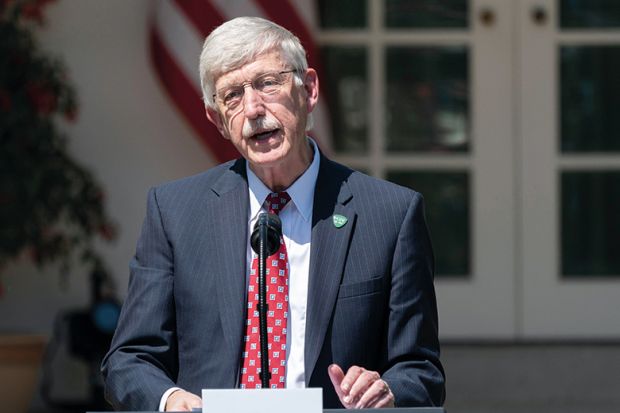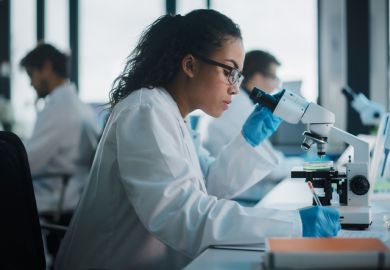In one of the more improbable alliances of the Trump presidency, the soft-spoken and fact-centric Francis Collins is reaching 10 years as head of the US National Institutes of Health.
The milestone, despite some 50 top-level firings and resignations from the administration, suggests that, for all the partisan rancour in Washington, research aimed at improving healthcare remains indisputably popular.
It is also a reflection of the genial southern charm and personal warmth of Dr Collins, the genome-solving, scripture-pondering, guitar-playing scientist-bureaucrat-diplomat-wonk who has largely managed, year after year, to convince Congress of the value of NIH’s mission.
The NIH, with an annual budget of $39 billion (£32 billion), is the world’s largest public funder of biomedical research and the biggest supplier of basic research money to US universities.
While the NIH budget supports its own in-house staff of about 6,000 scientists, more than 80 per cent of the agency’s money is awarded to 300,000 researchers at more than 2,500 universities and institutes worldwide.
And since the post-recession cutbacks, and even into the Trump administration – which has repeatedly asked Congress to slash science spending – the NIH has managed to attract leading levels of budgetary growth, both government-wide and as compared with its fellow science agencies.
Allies are eager to attribute a good measure of that success personally to Dr Collins, known for beginning semi-annual meetings of his expert advisory council with photos showing smiling members of both political parties from Capitol Hill accompanying him on tours of NIH facilities.
“The credit for that”, a former Collins chief of staff, Kathy Hudson, said of the NIH’s popularity in Congress, “certainly should flow at least in part to him and his ability to win allies on the Hill and make sure that their concerns and interests are attended to”.
Speaking to Times Higher Education, Dr Collins phrased it more obliquely. “I will say the confidence that has been built between Congress and the NIH leadership is really wonderful to see,” he allowed.
He and his admirers are more guarded in discussing the situation within the administration, led by a president known to be dismissive of science. There, the job is widely understood to mean patiently and repeatedly explaining the realities of research to administration officials, and trying to discuss their NIH-harming positions in formal testimony before Congress.
“My job is to try to make the case for the value of medical research,” Dr Collins said simply, and “I’m happy to do that to any audience – I get the chance to do that within the administration, and I get the chance to do it in the Congress.”
“It doesn’t always translate into policies that I had hoped for,” Dr Collins said. One of the most recent, in the eyes of many scientists, was the NIH order imposing new restrictions on human fetal tissue research. “But ultimately”, he said, “I think we have a system, when the dust all settles, that’s pretty good at sorting it all out.”
His work environment represents a stark transition from the Obama administration, which made a point of appointing leading academic scientists to its key science-related positions. When Mr Trump won the 2016 election, Dr Collins was expected to join the rest in leaving.
But as the Trump administration struggled to find and keep top officials, and delayed science-related appointments, Dr Collins remained in place and let it be known he would be willing to stay on. Not all in academic science endorsed the move, feeling that the resignation of such a celebrated thinker would have been more appropriate.
Dr Collins, who took office as NIH director on 17 August 2009, said he hadn’t expected to be kept on by Mr Trump “because that historically has simply not happened” – more than a half-century had passed since an NIH director remained after a change in administrations.
But as he and his wife mulled a new job “that would have the greatest impact on science, Diane and I kept coming back to, ‘Well, the job that has the greatest impact on science is the one you have right now, so maybe you should stick with it’”, he said. “And I'm glad I did – it’s really been remarkably gratifying.”
“The pace of science right now is so breathtaking in so many wonderful ways,” he said, citing the wide promise of single-cell biology, progress in vaccines and advances in neuroscience, among others.
Dr Collins also acknowledged several areas in which the NIH and universities have made improvements but need to do more, including funding and guiding younger researchers; enabling the pursuit of more open-ended exploratory science; and creating equal opportunities for minorities and women, especially as it involves confronting sexual harassment.
“I’m deeply concerned that our workforce still is not where it should be in terms of its diversity,” he said.
With Mr Trump seeking re-election next year, Dr Collins isn’t clear how long he’ll end up staying.
“I have no idea – I'm 69 years old, and I think there is an argument to be made that institutions need new perspectives from time to time,” he said. “Ten years is already a long time, but at the moment I feel like I’m making a useful contribution.”
Register to continue
Why register?
- Registration is free and only takes a moment
- Once registered, you can read 3 articles a month
- Sign up for our newsletter
Subscribe
Or subscribe for unlimited access to:
- Unlimited access to news, views, insights & reviews
- Digital editions
- Digital access to THE’s university and college rankings analysis
Already registered or a current subscriber? Login








